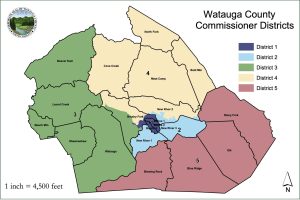Appalachian Trail moves to center of environmental debate in the Supreme Court
March 24, 2020
To Jasper Yoke, a “thru-hiker” of the Appalachian Trail, the AT is much more than a footpath stretching from Maine to Georgia.
“It’s a whole way of life, you know? It’s not just a physical trail, it’s like a community that changes every year but also has this interesting continuity through the years,” Yoke said. “It’s very much a walkabout, like a coming of age experience.”
Like Yoke, many App State students have a significant connection to hiking culture and the AT.
However, the AT is now at the center of an environmental debate, as the Atlantic Coast Pipeline seeks to continue its 600-mile journey from West Virginia through to Virginia and North Carolina, cutting across the trail.
As the longest hiking-only footpath in the world, with more than 3 million visitors a year, the AT has become one of the most well-known hiking trails in the United States and a prominent staple in Appalachian culture. Now, the Appalachian Trail has also become a barrier between the Atlantic Coast Pipeline and its continuation.
On Feb. 24, the United States Supreme Court heard arguments from the U.S Forest Service and the Cowpasture River Preservation Association to decide on whether or not the U.S Forest Service had the right to grant a permit for the Atlantic Coast Pipeline to cross the AT.
Many students, however, believe that the pipeline should not continue across the Appalachian Trail.
“I’ve never been one for fossil fuels at all, and I’ve never really been for expansion of the fossil fuel industry, and I’ve never been one for destruction of the natural environment,” Yoke said.
Brandon Turlington, a sustainable development major, with a concentration in agroecology and sustainable agriculture, said the U.S Forest Service did not have the right to grant a permit to the Atlantic Coast pipeline.
“I think the Forestry Service kind of overstepped its boundary of what is their control, and as we’ve seen with all kinds of pipelines, oil pipelines, gas pipelines, it leaks over time,” Turlington said.
Jack Spadaro, a mining engineer, and mine safety and health environmental specialist, said a large pipeline such as the Atlantic Coast Pipeline would have extremely negative effects on the environment.
“If you’re just walking the trail, and the pipeline goes underneath the trail, you think well what’s the damage here? It’s not that one little section of the trail that’s really affected, it’s the entire environment on both sides of the trail, going upslope and then back downslope, that really is creating the damage to the environment that the trail goes through and that’s why it’s so important.”
In addition to the Atlantic Coast Pipeline, several other pipelines cross or are attempting to cross, the Appalachian Trail. If allowed to continue, Spadaro said the Atlantic Coast Pipeline will be one of the largest projects to cross the AT because of the sear size of the pipeline, the methods used during its construction and the width it would cut.
“Those are the largest, most significant, environment damaging instructions into those forests and into the Appalachian Trail area that have ever existed,” Spadaro said. “That’s why there’s such resistance.”
Because of the danger to life around the trail, hikers like Turlington are hopeful that the Supreme Court will not allow the pipeline to continue across the AT.
“I think that with a trail that goes through such a diverse and sensitive region of plant life and animal life, it’s just asking for problems, in my opinion,” Turlington said. “So, I think that the Supreme court should rule in favor of the environment protection groups.”
However, despite the environmental repercussions of the pipeline, Spadaro is not optimistic about the Supreme Court’s decision, and said he believes the Supreme Court judges under the current administration will probably rule in favor of the industry.
“I would probably expect that the court will decide in favor of the gas industry,” Spadaro said.
Turlington said the pipeline court case calls into question what we as society deems more significant, the environment or money.
“I think (the pipeline) makes sense from an economic standpoint, but then it comes into question of what’s more important, like economic wellbeing or protection of our environment,” Turlington said.
Yoke said the pipeline continues a system of fossil fuel dependency that should end in favor of more environmentally friendly alternatives.
“No matter what, you need to provide energy for the country, but expanding the fossil fuel infrastructure should not be occurring,” Yoke said. “There should be no expanding of that infrastructure at all. It should be based on renewable energy, that’s what our expansion should be on.”











